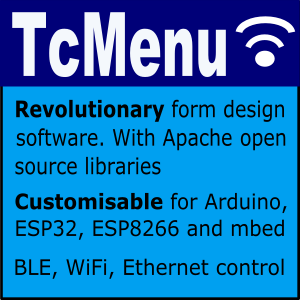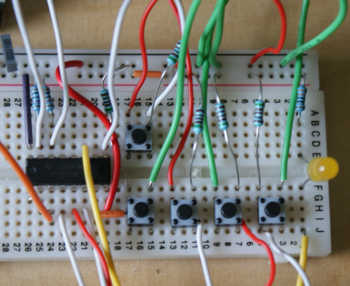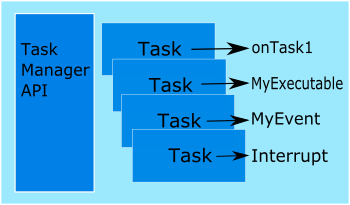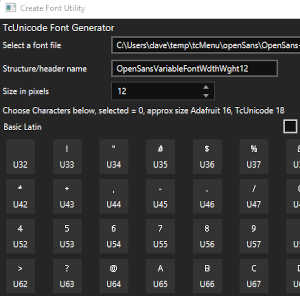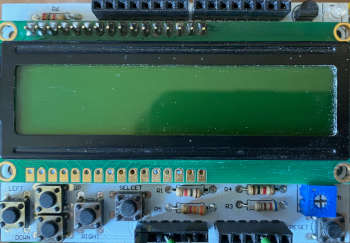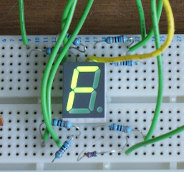Core libraries that we release regularly
There are several core libraries that we keep in lock step in terms of compatibility and board support. These libraries are:
- TaskManagerIO provides core event and task scheduling services to Arduino sketches.
- IoAbstraction provides user input, EEPROM and IO helper classes.
- tcMenu a fully fledged embedded menu framework with a designer UI and IoT capabilities
- tcUnicodeHelper UTF-8 unicode support for Adafruit_GFX, tcMenu, U8G2, LTDC, and TFT_eSPI.
- SimpleCollections a simple binary searchable list and a thread/interrupt safe circular buffer that work on a very wide range of boards.
- LiquidCrystalIO a task manager friendly fork of the Arduino LCD library that works over many IO devices.
The above libraries support a wide range of hardware, including nearly every official Arduino board, most ESP boards, along with many mbed version 5 and 6 boards with or without an RTOS. We test with everything from Uno to ESP32 and large STM32F4 boards.
What boards do our libraries support?
| Processor | Platform | Libraries | Locking | DAC | Developer boards we test with |
|---|---|---|---|---|---|
| AVR | Arduino | Fully tested | Atomic | No | Uno - some features limited |
| AVR | Arduino | Fully tested | Atomic | No | MEGA 2560, WifiR2 |
| SAMD | Arduino | Fully tested | Atomic | Yes | MKR1300 |
| SAMD | Seeed Arduino | Fully tested | Atomic | Yes | MG126 board |
| nrf52840 | Arduino(mbed) | Fully tested | CAS | Yes | Nano 33 BLE devices |
| RPI Pico | Arduino(mbed) | Fully tested | CAS | No | Raspberry PI pico, TFT, encoder |
| RPI Pico | Arduino(EarlePH) | Fully tested | CAS | No | Raspberry PI pico, TFT, encoder |
| ESP8266 | Arduino | Fully tested | Atomic | No | Node MCU, Heltek Wifi 8 |
| ESP32 | Arduino | Fully tested | CAS | Yes | Wifi32, AZ Dev Kit |
| ESP32S2 | Arduino | Fully tested | CAS | Yes | ESP32S2 Saloma |
| ESP32S3 | Arduino | Fully tested | CAS | No | ESP32S3 Tiny |
| STM32F4 | Stm32Duino | Fully tested | Hybrid | Yes | Nucleo STM32F4x9ZI OLED |
| Particle | Photon | User tested | Atomic | No | Unknown, user tested |
| SAM | Arduino | Compilation | Atomic | Yes | Arduino Due compile test only |
| STM32F4 | mbed RTOS | Fully tested | CAS | Yes | Nucleo/Disc1 STM32F4x9ZI LTDC/OLED |
| RP2040 | Pico-SDK/CMake | Fully tested | CAS | No | Tested fully within TcLibSDK |
Although we only test on some Arduino mbed boards, it should work on nearly all that we know of, you can take a look at the list of mbed boards we check for here, if another springs to light that we haven’t added please try adding it to that define statement, and if it works let us know.
- For both mbed direct and Arduino that’s based on mbed we rely on mbed inbuilt CAS locking. We’ve tested on a few different Arduino mbed and direct mbed boards.
- For ESP32 we use the underlying CAS capabilities to ensure cross core locking
- On ESP boards we call yield more often within the run loop to prevent watchdog resets.
- On Raspberry PI pico earlephilhower core, circular buffers and task manager use a critical section to synchronize data.
- On STM32Duino at the moment we are transitioning from using Arduino Atomic functions to using direct LDREX/STREX calls. Completed for CircularBuffer but not TaskManager.
Defining Build Flags and Platform settings
Most of our libraries support adding a file locally in the root of your source called zio_local_definitions.h, once added this will be included by the platform determination before doing anything else. This allows two ways of setting build level flags, firstly by providing them in the build options, secondly within this file. This means that you can easily define build options when using Arduino 1.x IDE.
In TaskManagerIO
Whenever you include TaskManagerIO.h this pulls in TaskPlatformDeps.h to work out what platform you’re building for, and to create suitable thread safety and CAS or Atomic based locking constructs for that platform. Again the thread safety is so that you can put events into task manager from any thread, or trigger events from interrupts. You should only ever call runLoop from a single thread, usually for the default taskManager instance that would be the loop() method on Arduino, or main() on mbed.
The follow build flags can be set either in your build tool or in zio_local_definitions.h:
DEFAULT_TASK_SIZE- sets the number of tasks in each block, if you define this you MUST defineDEFAULT_TASK_BLOCKStooDEFAULT_TASK_BLOCKS- sets the number of timesd task manager can allocate a block of sizeDEFAULT_TASK_SIZETM_ENABLE_CAPTURED_LAMBDASredefine task manager callback functions as std::function on boards that support it, therefore allowing argument capture.
In IoAbstraction
Whenever you include IoAbstraction.h or include PlatformDetermination.h directly, then IoAbstraction need to work out how to provide all input output features that it supports. This allows the rest of IoAbstraction not to concern itself with platform differences. This goes right down to GPIO, the way I2C works, and even analog IO support. For ESP32 we provide analog input and output using IDF functions, allowing the analog support on ESP32 to support the inbuilt DAC, ADC and PWM (using LEDC).
Platform related settings:
TMIOA_FORCE_ARDUINO_MBEDforce Arduino mbed for an undetected mbed board.IOA_DEVELOPMENT_EXPERIMENTALonly to enable untested features in development.IOA_USE_ESP32_EXTRASuse ESP32 specifc calls instead of the Arduino ones. Can easily be turned on/off, whatever works for your case.IOA_ENABLE_STM32_HAL_EXTRASenable STM32 specifc HAL features, such as battery backed ROM support.IO_MKR_FORCE_LOWRES_ANALOGforce MKR to use lower 8 bit resolution analog output.
Logging compile time settings:
IO_LOGGING_DEFAULT_LEVELthe default logging levels that are on, see theSerLoggingLevelenum for possible values that are ORed.IO_LOGGING_DEBUGturn logging on by defining this.LoggingPortoverride the default logging port on Arduino which isSerial, on mbed this should be dealt with at runtime.
Switches and encoder settings:
SWITCH_POLL_INTERVALthe poll interval in milliseconds, defaults to 20, changing this alters the other dependent parametersHOLD_THRESHOLDthe number of poll interval ticks before the key is considered heldSWITCHES_ACCELERATION_DIVISORthe divisor to apply to acceleration 0 = extremely fast (untested!), 1 = fast, 2 = regular, 3 = slowerREJECT_DIRECTION_CHANGE_THRESHOLDfor hardware rotary encoder debouncing - how long in micros before accepting a direction change.MAX_KEYSthe number of keys to define upfront, the array will be reallocated if needed at runtime.MAX_ROTARY_ENCODERSthe maximum number of rotary encoders that can be used, will not reallocate.MAX_JOYSTICK_ACCELthe maximum acceleration for analog joystick encoder emulationALLOWABLE_RANGEthe floating point amount that is used to determine if an analog button press is in range +/-, default is 0.01FTC_LEGACY_ENCODERif defined the legacyHardwareRotaryEncoderclass will be used instead of the newer state based class.
Touch specific settings:
TOUCH_THRESHOLDthe threshold at which a touch is considered to be made, floating point value, default is 0.05F
In TcUnicode library
Whenever you use TcMenu, TcUnicode is always included as well. It provides UTF-8 unicode support to many display libraries. Here are the configurable options:
HUGE_FONT_BITMAPSswitch on 32 bit support for font bitmap ranges, only needed for TcUnicode fonts that are particularly large, as font bitmaps are per unicode block already.
In TcMenu library
Whenever you include tcMenu.h you include IoAbstraction, SimpleCollections and TaskManagerIO by default. There are a few compile time settings for tcMenu itself, but you can also adjust all the settings for the dependant libraries too.
Menu item and iteration settings:
MAX_MENU_DEPTHthe maximum depth for non-recursive iteration, defaults to 4 levels deep.NAV_ITEM_ARRAY_SIZEdefines the default stack size for navigation, defaults to 4 levels.NAME_SIZE_Tsets the size of the char field for name items, defaults to 20 chars.UNIT_SIZE_Tsets the size of the char field for analog item units, defaults to 5 chars.TCMENU_NO_DEFAULT_ENCODERdo not allocate a default encoder when there is no other encoder.
Remote connectivity settings:
CLIENT_DESC_SIZEthe size of the client information received from a remote device, normally 16.MAX_PIN_LENGTHthe size of the pin storage field, normally 16.HEARTBEAT_INTERVALthe milliseconds between heartbeat messagesMAX_VALUE_LENthe largest value that can be received in a tag value message, must be at least 40.
Should you need serial number management, (IE you have more than one board):
TC_MANUAL_SERIAL_NO_IMPLindicate that you want to implementuint32_t getBoardSerialNumber()yourselfTC_BOARD_SERIAL_NOlong 32 bit integer containing the board serial number. Defaults to999999999L
Drawing specific:
NEED_32BIT_COLOR_T_ALPHAuse 32-bit colour information instead of 16-bitMINIMUM_CURSOR_SIZEensure that any cursor on a graphical display is at least this many pixelsTC_TOUCH_DEBUGturn on additional visual diagnotics for touch screens
In SimpleCollections
Simple collections circular buffer is thread and interrupt safe, this is achieved by checking the board type we have compiled to providing a suitable atomic compare and update facility for that platform. On mbed it uses mbed atomic, on STM32Duino F4 it uses LDREX, on ESP32 it uses the RTOS constructs. On other boards it uses standard Arduino atomic functions. It should be safe on all the boards listed in the supported section, and probably more besides.
TMIOA_FORCE_ARDUINO_MBEDforce Arduino mbed for an undetected mbed board.SC_USE_ARM_ASM_CASadvanced users only, force the use of ARM LDREX/STREX where we’ve not carefully tested it.
Java UIs and frameworks
In addition to this the Java UI framework which is heavily based on JavaFX is used for the designer, embedCONTROL UI and embedded java apps is tested on a wide range of hardware, we suggest using the excellent Liberica JDK as it has JavaFX built in, and a 32bit build for Raspberry PI available.
| Platform | Designer | embedCONTROL | Java Embedded | JDK Used |
|---|---|---|---|---|
| Windows 10/11 | Fully tested | Fully tested | Fully tested | Liberica |
| MacOS | Fully tested | Fully tested | Fully tested | Liberica |
| Ubuntu desktop | Fully tested | Fully tested | Fully tested | Liberica |
| Raspberry PI | Fully tested | Fully tested | Fully tested | Liberica |
JavaScript embedCONTROL.JS
The webserver version of embedCONTROL is built in TypeScript, we target most modern browsers and test with desktop and mobile version of both Chrome and Safari. The generated website is highly standards compliant, based on React.JS, and therefore should work with a very wide range of browsers.
Are there differences between platforms
We have tried as hard as we can to avoid any user-level differences in core features between platforms. It should work close to identically on all platforms that we support. There are obviously a few extra features on some platforms that are available to use, but when using these it should be pretty clear they platform specific.
TcMenu - IoT ready menu designer and library for Arduino and mbed
TcMenu is a modular, IoT ready multi level menu library for Arduino, mbed, Pico-SDK, mbed and many more platforms supporting many input, display and IoT / remote interfaces. It makes presenting configuration, status and operational information much easier. Apache licensed and therefore safe for commercial use. Start by working out what information and state is to be represented in the Designer UI. Take inspiration from the Arduino menu examples. Then, run Code Generator which outputs code for the selected board ready for use in an IDE.
IO Abstraction library
This library provides abstractions that help you write event-driven Arduino and mbed applications. It has device abstractions that allow you to treat device pins, PCF8574, MCP23017, MPR121 and AW9523 almost the same in code. This includes higher level interrupt management, buttons with de-bouncing, matrix keyboards, rotary encoders and even LiquidCrystalIO. There are many examples packaged with the library that cover most use cases. For development, you can use any Arduino or mbed IDE.
Simple Collection library for Arduino and mbed
SimpleCollections - Summary Simple collections provides a binary search based list and also a circular buffer that work over a wide range of devices, including Uno. This allows TcMenu and IoAbstraction to use this collection support even when running on an Uno board! Currently, most of the documentation is on GitHub and the reference docs are also linked below. Read the reference documentation Using btree list Using thread-safe circular buffers Go to the code repo on github Arduino library compatibility matrix and build time settings
TaskManagerIO library for Arduino and mbed
TaskManagerIO - Summary TaskManagerIO provides scheduling, events and interrupt marshalling, all while remaining thread safe across a wide range of boards. By thread safe we mean that you can add tasks to task manager from another thread while it’s still running. However, the task manager itself will always run on one thread, making it easy for you to write code. This library contains the original scheduling support class TaskManager that was previously built into IoAbstraction.
TcUnicodeHelper library for Arduino and mbed
TcUnicodeHelper is a library for presenting Unicode characters onto a wide range of display libraries, importantly, it works with standard versions of the libraries. It has its own font format that breaks the glyphs into Unicode block groups, and can even easily handle only a few of the glyphs with a block group being required very efficiently. At runtime it is quite light on memory and does not allocate anything outside initial setup.
LiquidCrystalIO Library
LiquidCrystalIO is a fork of the LiquidCrystal library for HD44780 devices that works on both Arduino and mbed devices, integrating with IoAbstraction library. Further, it also works either with device pins or any IO expansion device supported by IoAbstraction, including direct pins, PCF8574, PCF8575, MCP23017, MPR121, AW9523 and even shift registers. Importantly, HD44780 displays are slow, very slow in fact, running at around 270Khz. This means that there are inevitable delays involved in programming the device, in this fork those delays give some time back to task manager so that other tasks can run while waiting.
Adafruit GFX fork providing OLED support on mbed RTOS
We maintain a fork of Adafruit_GFX that provides OLED support on mbed RTOS, it’s based on the original work by both AdaFruit - Adafruit_GFX repo and the original SSD1306 library for mbed 2. We’ve got everything to compile on mbed RTOS 5 & 6, and we use it ourselves on our STM32F439 test board as one of our core tests. Arduino library compatibility matrix and build time settings The repository is hosted on GitHub [https://github.
LED Display (7-Seg)
LED Display is a library that can manage multiple 7-segment displays using the multiplex technique.
